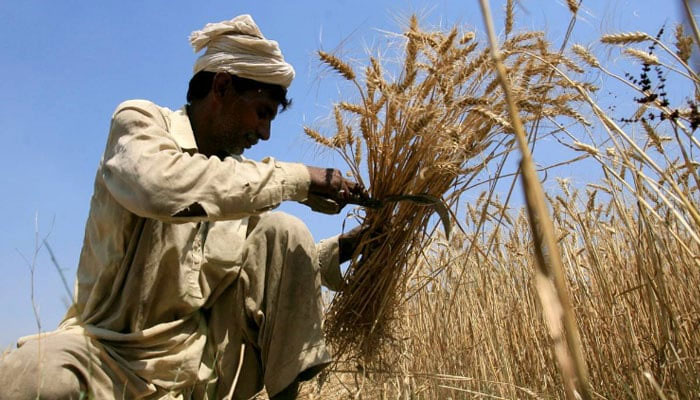US to launch $24m Climate Smart Agriculture project for Pakistan
Climate Smart Agriculture project will equip farmers with climate-resilient seeds, conservation practices
ISLAMABAD: The United States (US) has announced the launch of a five-year $24 million initiative next week to boost Pakistan’s agricultural sector by enhancing the resilience of farmers with the help of climate-smart technologies and practices.
The Climate Smart Agriculture project to be executed by Kaizen, a Tetra Tech company, will equip farmers with climate-resilient seeds, conservation practices, and eco-friendly pest management to help communities adapt to a changing climate, according to the US Embassy in Islamabad.
“This is a five-year US investment programme for Pakistani agricultural sector that will enable Pakistani farmers to adapt to environmental changes such as unpredictable weather, heatwaves, drought, and irregular rainfall,” the embassy said in a message.
It added that the Climate Smart Agriculture initiative would provide farmers with better access to climate-resistant seeds, which could withstand drought and heat, and increase yields as well.
The US Mission said that through the 2024-29 programme, Pakistani farmers would be introduced to modern and better methods of agriculture, modern machinery of harvesting and sowing, agricultural drones and sensors, irrigation and farm management software.
This will facilitate timely diagnosis of crop health and potential issues, conservation of water and land resources, and timely access to markets and capital, thereby increasing crop yields, according to it. “This programme is a continuation of US investment in Pakistan’s agriculture sector from 1960s to 1970s, when the US financial assistance, research, and technology laid the foundation of the Green Revolution in the region.”
Meanwhile, the Kaizen Company pointed out that the Climate Smart Agriculture activity was part of the US-Pakistan Green Alliance framework, aimed at fostering bilateral cooperation to address climate, environmental, and economic challenges.
It said that the initiative focused on building resilience within Pakistan’s farming communities by promoting the adoption of climate-smart agricultural practices and technologies.
“By increasing agricultural productivity and incomes sustainably, the $24 million CSA activity aligns with USAID’s goals of inclusive economic growth, gender equity, and environmental stewardship. Activities will be implemented in a context-sensitive manner to promote increased agricultural productivity, higher resilience to climate change, and economic participation and greater incomes of socially marginalised groups, women, and girls at different stages of agricultural production and processing.”
Kaizen said that CSA, in partnering with the private sector, civil society, technology firms and government stakeholders, aimed to maximise the effectiveness and impact of investments.
-
 Breezy Johnson Engaged At Olympics After Emotional Finish Line Proposal
Breezy Johnson Engaged At Olympics After Emotional Finish Line Proposal -
 King Charles Wants Andrew To 'draw A Line' Under Epstein Issue
King Charles Wants Andrew To 'draw A Line' Under Epstein Issue -
 John Wick Game Confirmed With Keanu Reeves And Lionsgate Collaboration
John Wick Game Confirmed With Keanu Reeves And Lionsgate Collaboration -
 Gigi Hadid Feels 'humiliated' After Zayn Malik's 'pathetic' Comment: Source
Gigi Hadid Feels 'humiliated' After Zayn Malik's 'pathetic' Comment: Source -
 Olympics Men Hockey Game: McDavid, Crosby Power Canada Past Czechia
Olympics Men Hockey Game: McDavid, Crosby Power Canada Past Czechia -
 Sony PlayStation State Of Play Reveals 'Castlevania' And 'Metal Gear' Return
Sony PlayStation State Of Play Reveals 'Castlevania' And 'Metal Gear' Return -
 Ontario Tuition Freeze Ends, Allowing Colleges And Universities To Raise Fees
Ontario Tuition Freeze Ends, Allowing Colleges And Universities To Raise Fees -
 King Charles Should Apologise To All Rape Victims, Says New Poll
King Charles Should Apologise To All Rape Victims, Says New Poll -
 Cardi B Shares Emotional Message Amid Stefon Diggs Split Rumors
Cardi B Shares Emotional Message Amid Stefon Diggs Split Rumors -
 James Van Der Beek’s 'heartbroken' Ex Wife Breaks Silence Of His Death
James Van Der Beek’s 'heartbroken' Ex Wife Breaks Silence Of His Death -
 Sarah Ferguson, Shamed Andrew Spotted In ‘family Costume Drama’
Sarah Ferguson, Shamed Andrew Spotted In ‘family Costume Drama’ -
 Kylie Kelce Reveals Why She Barely Planned Her Wedding Day?
Kylie Kelce Reveals Why She Barely Planned Her Wedding Day? -
 Why Shamed Andrew Called His Victims ‘Mrs Windsor’
Why Shamed Andrew Called His Victims ‘Mrs Windsor’ -
 Kate Hudson Explains Why Acting Isn't Discussed At Home
Kate Hudson Explains Why Acting Isn't Discussed At Home -
 Prince William, Kate Middleton Epstein Statement Was AI Generated, Says Expert
Prince William, Kate Middleton Epstein Statement Was AI Generated, Says Expert -
 Sarah Ferguson On Her Way To Hurt 'only Two People Who Care About Her'
Sarah Ferguson On Her Way To Hurt 'only Two People Who Care About Her'




